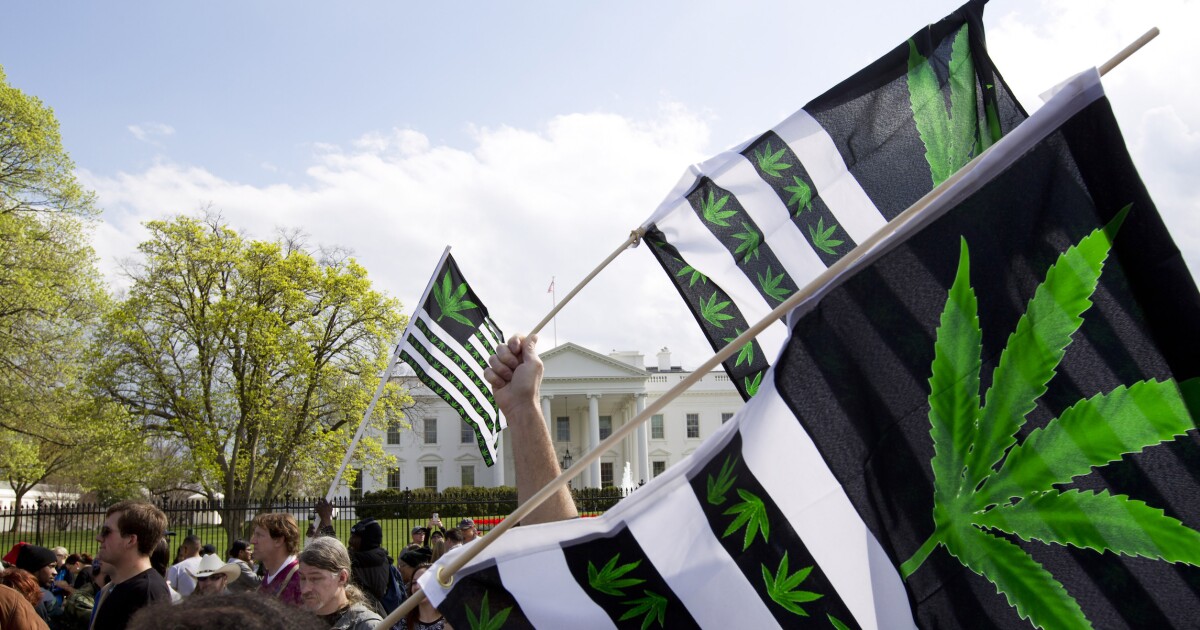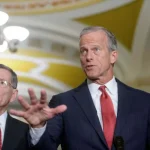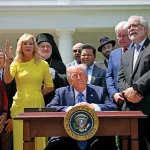

President Joe Biden delivered an October surprise last week by announcing a slate of moves that will see marijuana possession crimes pardoned and potentially pave the way toward federal legalization.
But whatever its effect on the midterm elections, it may be a long time before the drug is removed from the federal Schedule 1 level of substances — if it happens at all.
MARIJUANA BLACK MARKETS FLOURISH DESPITE LEGALIZATION
“As I’ve said before, no one should be in jail just for using or possessing marijuana,” Biden wrote in a tweet last Thursday. “Sending people to jail for possessing marijuana has upended too many lives — for conduct that is legal in many states. That’s before you address the clear racial disparities around prosecution and conviction. Today, we begin to right these wrongs.”
The move means many things in the long term, but in the short term, it could have an impact on the all-important midterm elections. The next day, Biden visited Pennsylvania, where Democratic Senate candidate John Fetterman has made pro-marijuana policies a major plank of his campaign. Fetterman even called on Biden to deschedule the drug ahead of a joint appearance on Labor Day.
Last Friday, Biden attracted a crowd while walking through the University of Pennsylvania with his granddaughter. Two young men yelled out — not about student loans or Roe vs. Wade, but about marijuana.
“Yo, Joe!” they yelled as he entered the campus bookstore. “Legalize that weed!”
Though the White House promoted the move as fulfilling a campaign promise, Republicans attacked it as a naked ploy to secure votes.
“This move maybe makes sense in individual cases,” tweeted Ohio Attorney General Dave Yost. “But Biden’s blanket pardon 34 days before an election is the most political, cynical abuse of the pardon power in history.”
While the presidential pardon of 6,500 people for simple marijuana possession grabbed headlines, Biden also called for Health and Human Services Secretary Xavier Becerra to review how the drug is scheduled under federal law. It’s classified in Schedule 1 now, the same as drugs such as heroin and LSD, and going to Schedule 2 or a full deschedule could pave the way for full federal legislation.
Reporters weren’t able to ask Biden follow-up questions — the announcement was made via tweet and video rather than a press conference — and it’s unclear how long the process will take.
“We will move expeditiously to review the scheduling of marijuana as the president directed,” HHS Assistant Secretary for Public Affairs Sarah Lovenheim said in response to questions from the Washington Examiner. When pressed about how long the review would take and what might result from it, Lovenheim said she had “nothing further” to share.
But it’s likely to be a long process.
Penn State public policy professor Daniel Mallinson said the review will likely take years, and the process is more commonly used to move drugs up the scale, not down or off.
“This is a process that will involve several agencies who have different missions. [The Drug Enforcement Administration] basically enforces drug prohibition, HHS has a health and medical mission, and [the Food and Drug Administration] regulates legal pharmaceuticals,” Mallinson said.
“It’s quite possible they will have different views on what should happen with marijuana,” he continued. “The process will be slow and very well could last until after the 2024 presidential election. That opens questions about what a potential President Trump or Desantis would do if they take over this process.”
A further complication is a lack of research on marijuana, which also owes to its Schedule 1 status.
Despite a growing acceptance of marijuana use among the public, the topic remains divisive. A recent Gallup poll found that 50% of respondents believed the drug is detrimental to society. Slightly more than half, 53%, said marijuana has a positive effect on most users, and 45% said it has a net negative effect.
Biden and his vice president, Kamala Harris, have a long history of anti-marijuana stances. Biden is a long-standing opponent of marijuana use and of policies that would decriminalize the drug, a position that has only softened somewhat in recent years.
As a senator, he helped pass the 1994 crime bill that included mandatory minimum sentences for marijuana possession. Reports surfaced in March 2021 that he had fired five White House staffers over their marijuana use, which was later confirmed by press secretary Jen Psaki.
Harris laughed at the idea of legalization less than a decade ago. She also declined to join a bid to remove marijuana from the Drug Enforcement Administration’s list of most dangerous substances while she was attorney general and was accused of failing to help the state’s cannabis industry during a 2011 federal crackdown.
In recent years, the vice president has changed course, sponsoring a bill that would loosen marijuana laws during her time in the Senate.
CLICK HERE TO READ MORE FROM THE WASHINGTON EXAMINER
There remains hesitation within the federal government as well, including at the National Institute on Drug Abuse, which is part of HHS.
The institute’s director, Nora Volkow, said in August that there was an “urgent need” for research into the long-term effects and benefits of marijuana use, such as its effect on brain development, while suggesting that legalization by states could add to the harmful perception that it is a “safe drug.”
“The trends that we’ve found highlight the urgent need to gain a better understanding of the potential health risks and benefits of cannabis use among young adults,” Volkow said. “Brain development occurs into a person’s mid-20s, so cannabis use among youth and young adults is a concern.”







